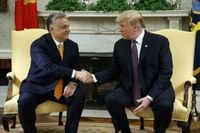Hungarian Prime Minister Viktor Orbán has made it clear that Hungary will not bow to mounting pressure from the United States, NATO, or the European Union to halt its imports of Russian oil and natural gas. In a week marked by diplomatic phone calls and public statements, Orbán’s stance—firmly prioritizing Hungary’s national interests over international demands—has brought the country’s energy policy and its broader geopolitical alignment into sharp relief.
The latest episode unfolded after a phone call between Orbán and former U.S. President Donald Trump, who had called on all NATO countries, including Hungary, to stop purchasing Russian oil. Trump’s appeal followed a briefing with Ukrainian President Volodymyr Zelenskiy, during which the former U.S. leader floated the idea of asking Orbán to cut Russian crude procurements. According to Bloomberg, Orbán told reporters after the call that Hungary would continue to buy Russian energy, stressing, “We need not accept each other’s arguments. We just need to talk clearly about our interests and listen to each other as friends, then everyone does as they wish.”
Orbán’s comments didn’t stop there. In an interview with Hungarian radio on September 27, 2025, he reiterated his position, stating that boycotting Russian energy would cause a “disaster” for Hungary’s economy. “I told the US president that if Hungary is cut off from Russian oil and natural gas, immediately, within a minute, Hungarian economic performance will drop by 4 percent,” Orbán said, according to Morning Star. “It means the Hungarian economy would be on its knees.”
This figure—an immediate 4% drop in Hungary’s economic output—has become the centerpiece of Orbán’s argument. He emphasized that as a landlocked country without direct access to the sea, Hungary’s options for diversifying its energy supplies are severely limited. Giving up piped Russian oil and gas, he warned, would ruin the country’s economy. Orbán underscored this point in remarks to state radio, as reported by Rigzone: “As a landlocked country, giving up piped Russian oil and gas would ruin Hungary’s economy.”
Orbán’s stance places Hungary in a unique position within the European Union and NATO. While most EU members have managed to wean themselves off Russian energy since Russia’s full-scale invasion of Ukraine in February 2022, Hungary remains one of the few European countries still buying Russian oil and natural gas. Slovakia, Hungary’s neighbor to the north, has also continued to import Russian energy, highlighting the geographical and infrastructural constraints facing some Central European states.
But it’s not just geography at play. Orbán has long emphasized Hungary’s national sovereignty and the right to pursue policies that serve its own interests, even if they diverge from those of its allies. “Hungary and the US are sovereign countries. There is no need for either of us to accept the arguments of the other. America has its arguments and interests and Hungary does too,” Orbán said, as quoted by Morning Star. This sentiment was echoed in his statement to state media: “The Hungarian government will follow its own interests on energy purchases and need not accept the US administration’s guidance on the matter.”
The timing of Orbán’s remarks is significant. The phone call with Trump came after the former U.S. president’s public call for NATO countries to stop buying Russian oil, a move he claimed could help end the war in Ukraine. Trump didn’t just single out Hungary; he also urged Turkey to curb its energy imports from Russia during a meeting with Turkish President Recep Tayyip Erdogan on September 25, 2025, according to Rigzone.
Despite these appeals, Orbán has shown little inclination to change course. His government’s position is rooted in a combination of economic pragmatism, infrastructural realities, and a political philosophy that prizes sovereignty above all else. Hungary’s continued reliance on Russian energy is not simply a matter of choice, Orbán argues, but of necessity. The country’s energy infrastructure is built around pipeline deliveries from Russia, and alternatives—such as liquefied natural gas (LNG) delivered by sea—are not readily accessible due to Hungary’s landlocked geography.
Orbán’s relationship with Russia has drawn scrutiny and criticism from other EU and NATO members, particularly since the 2022 invasion of Ukraine. While the majority of Europe has sought to isolate Moscow economically, Orbán has maintained close contacts with the Kremlin, treading a fine line between his allegiance to Western allies and his country’s longstanding ties to Russia. This balancing act has not been without its risks; it has fueled tensions within the EU and raised questions about Hungary’s commitment to the bloc’s common foreign and security policies.
Yet, for Orbán, the calculus appears straightforward. The economic costs of severing ties with Russian energy suppliers, he insists, would far outweigh any potential diplomatic gains. “Cutting off piped energy sources would immediately cause a 4 percent drop in Hungary’s economic output,” he told state radio, as reported by Rigzone. For a country that has faced its share of economic challenges in recent years, such a shock could be devastating.
Orbán’s comments also highlight a broader debate within Europe about energy security, sovereignty, and the limits of solidarity in times of crisis. While some leaders argue that ending purchases of Russian oil and gas is a moral and strategic imperative, others—like Orbán—see it as an unrealistic demand that fails to account for the specific circumstances of different countries. The Hungarian prime minister’s insistence on clear communication and mutual respect—“We just need to talk clearly about our interests and listen to each other as friends, then everyone does as they wish”—reflects a pragmatic, if controversial, approach to international relations.
As the war in Ukraine grinds on and the global energy landscape continues to shift, Hungary’s decision to maintain its imports of Russian oil and gas will remain a flashpoint in European and transatlantic politics. Whether Orbán’s gamble pays off in the long run—or leaves Hungary isolated from its allies—remains to be seen. But for now, his message is unambiguous: Hungary will put its own interests first, even if it means defying some of the world’s most powerful leaders.
In a world where energy and politics are increasingly intertwined, Orbán’s steadfastness offers a vivid illustration of the difficult choices facing small nations caught between competing pressures. For Hungary, the path forward is fraught with challenges—but, as Orbán makes clear, it’s a path the country intends to walk on its own terms.


